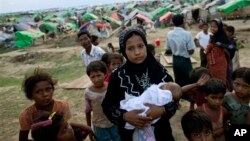Authorities in Burma say they will review a family planning policy that imposes a two-child limit on Rohingya Muslims in two townships in the Southeast Asian nation’s Rakhine State. The policy was introduced under military rule in 1994, but in recent years has been unenforced. International human rights groups and Burmese political activists have condemned the decision.
The United States opposes coercive and discriminatory birth limitation policies, and U.S. officials have pressed senior Burmese government leaders to abolish the order. We urge the Government of Burma to eliminate all such policies without delay.
The Burmese government convened an independent commission last summer to identify underlying causes of violence in Rakhine State and to suggest solutions.
Two separate episodes of violence in June and October left more than 200 dead and displaced about 140,000. Most of the victims are Rohingya, who are not recognized as citizens in Burma despite having lived there for generations.
In a report released in late April, the commission offered more than 50 suggestions to reduce conflict in the region, including the two-child limit as a way to ease population pressures.
The United States encourages the Government of Burma to develop a long-term solution to the crisis in Rakhine State that addresses the humanitarian needs of all of region’s residents in a manner consistent with international norms and principles. Selectively targeting groups for discriminatory treatment runs counter to the government’s responsibility to protect all of its people.
The United States has stressed to the Burmese government, local authorities, religious leaders, and representatives of civil society that respect for, and protection of, human rights and fundamental freedoms, along with reintegration, redress and reconciliation are the path toward lasting peace.
The United States opposes coercive and discriminatory birth limitation policies, and U.S. officials have pressed senior Burmese government leaders to abolish the order. We urge the Government of Burma to eliminate all such policies without delay.
Selectively targeting groups for discriminatory treatment runs counter to the government’s responsibility to protect all of its people.
Two separate episodes of violence in June and October left more than 200 dead and displaced about 140,000. Most of the victims are Rohingya, who are not recognized as citizens in Burma despite having lived there for generations.
In a report released in late April, the commission offered more than 50 suggestions to reduce conflict in the region, including the two-child limit as a way to ease population pressures.
The United States encourages the Government of Burma to develop a long-term solution to the crisis in Rakhine State that addresses the humanitarian needs of all of region’s residents in a manner consistent with international norms and principles. Selectively targeting groups for discriminatory treatment runs counter to the government’s responsibility to protect all of its people.
The United States has stressed to the Burmese government, local authorities, religious leaders, and representatives of civil society that respect for, and protection of, human rights and fundamental freedoms, along with reintegration, redress and reconciliation are the path toward lasting peace.






